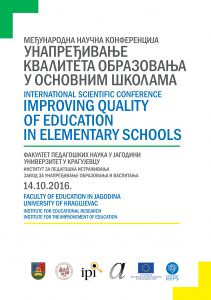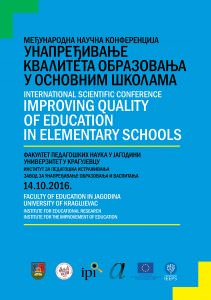THE INTERNATIONAL SCIENTIFIC CONFERENCE
„IMPROVING QUALITY OF EDUCATION IN ELEMENTARY SCHOOLS”
The International Scientific Conference „Improving quality of education in elementary schools” was organized by the Faculty of Education of University of Kragujevac, the Institute for Educational Research and the Institute for Improvement of Education within the Comenius IEEPS project “Improving educational effectiveness of primary schools”.  The conference was held on October 14th 2016 at the Teacher Training Faculty in Belgrade and has been accredited as a form of professional development for school practitioners.
The conference was held on October 14th 2016 at the Teacher Training Faculty in Belgrade and has been accredited as a form of professional development for school practitioners.
The most important aim of the conference was to promote research findings on the factors of quality education in elementary schools (primary and lower secondary education). The conference was focused on identification of the most important determinants of attainment of functional knowledge, development of critical thinking, motivation and interest, and acquirement of other positive education outcomes.
Main conference topics were:
- Individual factors of education outcomes (socio-economic, psychological and other)
- Factors of quality teaching (teachers, teaching methods, classroom climate and other)
- Improving education at the school level (school climate, cooperation, leadership and other factors)
- Education policies and education outcomes (school evaluation, curriculum, teacher professional development, school financing and other factors)
Programme Committee Chair
Dr Jelena Teodorović, Faculty of Education, University of Kragujevac, Serbia
Programme Committee Members
Dr Leonidas Kyriakides, Department of Education, University of Cyprus
Dr Charalambos Y. Charalambous, Department of Education, University of Cyprus
Dr Jan Van Damme, Centre for Educational Effectiveness and Evaluation, Catholic University of Leuven, Belgium
Dr Mika Risku, Institute of Educational Leadership, University of Jyväskylä, Finland
Dr Gašper Cankar, National Examinations Centre, Ljubljana, Slovenia
Dr Beatrijs De Freine, Faculty of Psychology and Educational Sciences, Catholic University of Leuven, Belgium
Dr Margarita Christoforidou, Department for Educational Leadership and Management, Cyprus
International Institute of Management, Nicosia, Cyprus
Dr Ovidiu Gavrilovici, Faculty of Psychology and Educational Sciences, Alexandru Ioan Cuza
University, Romania
Dr Vilmos Vass, Budapest Metropolitan University, Budapest, Hungary
Dr Biljana Trebješanin, Teacher Education Faculty, University of Belgrade, Serbia
Dr Vera Spasenović, Department of Pedagogy and Andragogy, Faculty of Philosophy, University of Belgrade, Serbia
Dr Vesna Petrović, Faculty of Education, University of Kragujevac, Serbia
Dr Ivana Đerić, Institute for Educational Research, Belgrade, Serbia
Dr Irena Golubović-Ilić, Faculty of Education, University of Kragujevac, Serbia
Dr Jasmina Šefer, Institute for Educational Research, Belgrade, Serbia
Dr Jelena Radišić, Faculty of Educational Sciences, University of Oslo, Norway
Dr Jelena Starčević, Faculty of Education, University of Kragujevac, Serbia
Dr Milja Vujačić, Institute for Educational Research, Belgrade, Serbia
Dr Snežana Mirkov, Institute for Educational Research, Belgrade, Serbia
Organization Committee Chair
Dr Ivana Đerić, Institute for Educational Research, Belgrade, Serbia
Conference Secretary
MA Dragan Vesić, Institute for Educational Research, Belgrade, Serbia
Members of the Organization Committee
Dr Vesna Petrović, Faculty of Education University of Kragujevac, Serbia
MA Bojana Dimitrijević, Faculty of Education University of Kragujevac, Serbia
The Conference opened:
- Dr Jelena Teodorović, Programme Committee Chair, Faculty of Education, University of Kragujevac, Serbia
- Dr Nikoleta Gutvajn, director of Institute for Educational Research, Belgrade
- Dr Zoran Avramović, director of Institute for Improvement of Education, Belgrade
Plenary papers at the Conference were presented by Jelena Teodorović, Faculty of Education, University of Kragujevac, Serbia; Irena Latinović, Social Inclusion and Poverty Reduction Unit of the Government of Serbia; Jan Van Damme, Centre for Educational Effectiveness and Evaluation, Catholic University of Leuven, Belgium; Leonidas Kyriakides, Department of Education, University of Cyprus; Darko Zupanc and Gašper Cankar, National Examinations Centre, Ljubljana, Slovenia.
A significant number of scientists and researchers in the field of education from the country and abroad (Cyprus, Belgium, Romania, Croatia, Slovenia, Montenegro) participated in the Conference. The active participation of school practitioners (teachers, teachers and professional associates) – in presenting the papers and discussing with other participants – was a special contribution to the quality of the Conference, which encouraged open dialogue and effective cooperation of researchers, decision-makers, teachers, professional associates and school directors.</>
The main conclusions of the Conference
- The emphasis was put on the importance of research and reassessment of the teaching quality on three levels: the micro-level (researching the teaching and teachers), meso-level (researching educational policies) and macro-level (researching education within a wider social context);
- A participatory and research-based approach to teaching planning and programming is required;
- It is necessary to improve the teachers’ competences in representing abstract mathematical concepts in different ways, in order to make them more concrete and adoptable to students;
- The complexity of the phenomenon of school violence was indicated, as well as the numerous difficulties in researching and developing of the intervening and preventive programmes concerning this issue;
- A continued research of effective ways of developing and encouraging students reading competences is required.
The results of the research and conclusions presented at the Conference should contribute to the conception of changes in education policies towards improving the quality of education of pupils in primary schools.
![]() Proceedings, conference “Improving quality od education in elementary schools“
Proceedings, conference “Improving quality od education in elementary schools“
